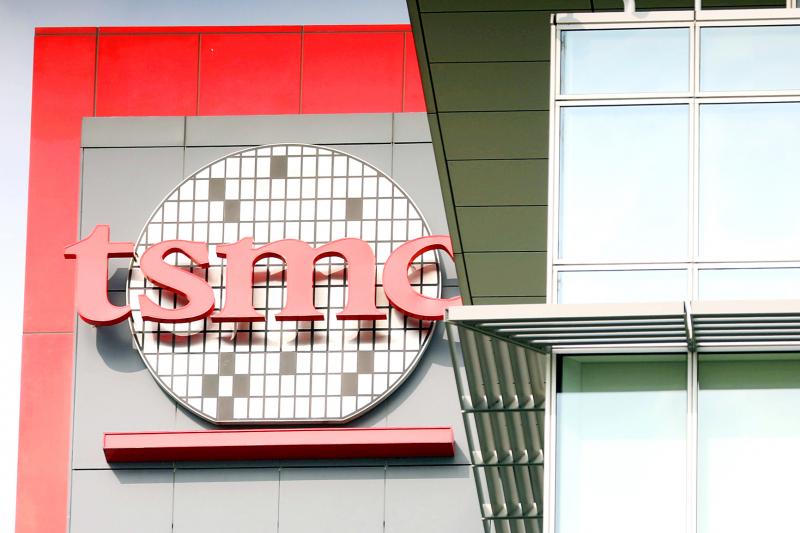Taiwan Semiconductor Manufacturing Co (TSMC, 台積電), a supplier to Apple Inc, yesterday reported a record high revenue of NT$127.59 billion (US$4.4 billion) for last month, up 3.8 percent month-on-month and 24.9 percent year-on-year.
Last month’s figure marked the second consecutive monthly record, after reaching NT$122.88 billion in August, the company said.
TSMC, the world’s largest contract chipmaker, said that while it had to halt shipments to Huawei Technologies Co (華為) due to the US’ blacklisting of the Chinese company, demand from other clients remained high.

Photo: Reuters
TSMC’s consolidated revenue was NT$356.43 billion in the third quarter, an increase of 14.71 percent from a quarter earlier, which beat its target of 9.3 percent growth.
On an annual basis, third-quarter revenue rose from NT$293 billion a year earlier and beat the average forecast of NT$337.2 billion by analysts, a Bloomberg poll showed.
The increase was driven mainly by solid demand for chips for 5G equipment, Internet of Things (IoT) and high-performance applications, as well as for 5-nanometer chips for Apple’s next generation iPhone 12, and its iPad Air and iPad Pro, the chipmaker said.
In the first three quarters, accumulated sales totaled NT$977.72 billion, up 29.9 percent from a year earlier, company data showed.
TSMC in July raised its outlook for this year, projecting that revenue would grow more than 20 percent.
Sales for the first nine months suggest that the chipmaker is on track to meet its growth forecast as the COVID-19 pandemic fueled demand for home computing equipment.
Strong demand for 5G chips is expected to boost TSMC’s sales by 8 to 10 percent in the fourth quarter, while its revenue for this year is likely to show more than 20 percent growth, said Dan Wang, a technology analyst at research firm Gavekal Dragonomics (龍洲經訊).
“Although TSMC can overcome the short-term hit of losing Huawei, it will face a bigger problem if the US government continuously limits its ability to work with Chinese companies, which make up a quarter of its clients today and will continue to keep growing,” Wang said.
Shares rose 2.26 percent yesterday to close at NT$453 in Taipei trading, after surging more than 80 percent since March, a sign that the company is bouncing back from disruptions caused by COVID-19.

Hon Hai Precision Industry Co (鴻海精密) yesterday said that its research institute has launched its first advanced artificial intelligence (AI) large language model (LLM) using traditional Chinese, with technology assistance from Nvidia Corp. Hon Hai, also known as Foxconn Technology Group (富士康科技集團), said the LLM, FoxBrain, is expected to improve its data analysis capabilities for smart manufacturing, and electric vehicle and smart city development. An LLM is a type of AI trained on vast amounts of text data and uses deep learning techniques, particularly neural networks, to process and generate language. They are essential for building and improving AI-powered servers. Nvidia provided assistance

DOMESTIC SUPPLY: The probe comes as Donald Trump has called for the repeal of the US$52.7 billion CHIPS and Science Act, which the US Congress passed in 2022 The Office of the US Trade Representative is to hold a hearing tomorrow into older Chinese-made “legacy” semiconductors that could heap more US tariffs on chips from China that power everyday goods from cars to washing machines to telecoms equipment. The probe, which began during former US president Joe Biden’s tenure in December last year, aims to protect US and other semiconductor producers from China’s massive state-driven buildup of domestic chip supply. A 50 percent US tariff on Chinese semiconductors began on Jan. 1. Legacy chips use older manufacturing processes introduced more than a decade ago and are often far simpler than

STILL HOPEFUL: Delayed payment of NT$5.35 billion from an Indian server client sent its earnings plunging last year, but the firm expects a gradual pickup ahead Asustek Computer Inc (華碩), the world’s No. 5 PC vendor, yesterday reported an 87 percent slump in net profit for last year, dragged by a massive overdue payment from an Indian cloud service provider. The Indian customer has delayed payment totaling NT$5.35 billion (US$162.7 million), Asustek chief financial officer Nick Wu (吳長榮) told an online earnings conference. Asustek shipped servers to India between April and June last year. The customer told Asustek that it is launching multiple fundraising projects and expected to repay the debt in the short term, Wu said. The Indian customer accounted for less than 10 percent to Asustek’s

Gasoline and diesel prices this week are to decrease NT$0.5 and NT$1 per liter respectively as international crude prices continued to fall last week, CPC Corp, Taiwan (CPC, 台灣中油) and Formosa Petrochemical Corp (台塑石化) said yesterday. Effective today, gasoline prices at CPC and Formosa stations are to decrease to NT$29.2, NT$30.7 and NT$32.7 per liter for 92, 95 and 98-octane unleaded gasoline respectively, while premium diesel is to cost NT$27.9 per liter at CPC stations and NT$27.7 at Formosa pumps, the companies said in separate statements. Global crude oil prices dropped last week after the eight OPEC+ members said they would